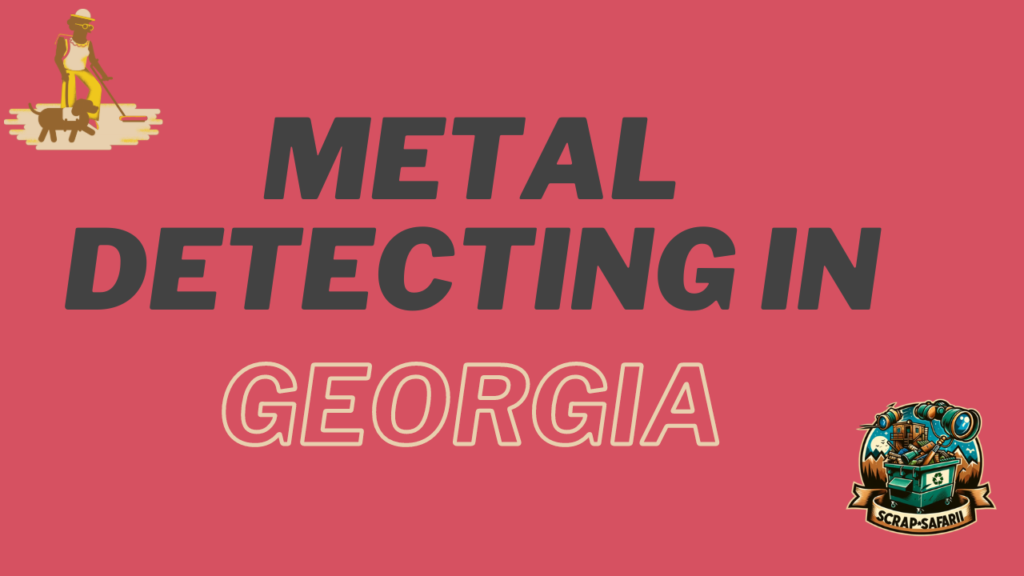Metal detecting in Georgia is a popular hobby, where enthusiasts use specialized metal detectors to scan the ground for buried metal objects. This exciting pastime allows you to uncover a wide array of treasures, from valuable coins and jewelry to fascinating historical relics.
Georgia’s rich history and diverse landscapes make it an ideal destination for metal detecting adventures. From the coastal beaches and barrier islands to the rolling hills and historic battlefields, there are numerous potential hot spots for uncovering hidden gems.
While metal detecting is generally permitted in many public areas across the state, it’s crucial to understand and follow the relevant laws and regulations. Georgia’s metal detecting laws aim to strike a balance between allowing hobbyists to pursue their passion while also protecting archaeological sites and preserving the state’s cultural heritage.
Is Metal Detecting in Georgia Legal?
Georgia has no state laws prohibiting metal detecting on public lands. This means you can legally metal detect in most public areas like parks, beaches, and campgrounds without a permit. However, there are some important restrictions to be aware of.
While Georgia allows metal detecting on state-owned public lands, it is illegal to use a metal detector on federally-owned lands like national parks, forests, and military bases without proper permission. You also cannot metal detect on private property or designated historic sites without the landowner’s consent.
One key state law to know is the Official Code of Georgia Annotated (OCGA) 12-3-621, which requires you to notify the state archaeologist before digging on any archaeological sites. This law aims to protect Georgia’s archaeological resources and heritage.
Even when metal detecting is allowed, you must be respectful of the land and any artifacts you uncover. It’s essential to obtain the necessary permissions, follow all applicable laws and regulations, and leave no trace of your activities.
Where to Metal Detect in Georgia
Public parks in Georgia are generally open for metal detecting, though certain areas may be off-limits. It’s best to check with the specific park for any rules or restrictions before you start detecting. Many parks will allow metal detecting in designated areas like picnic grounds or open fields.
Beaches are another excellent location for metal detecting in Georgia. The state’s coastal islands like Tybee Island, Jekyll Island, and Cumberland Island are popular spots to search for lost coins, jewelry, and other treasures that have washed ashore over the years.
Campgrounds and picnic areas within Georgia’s state parks can also be promising places to metal detect, as long as it’s not explicitly prohibited. These areas often see a lot of foot traffic, increasing the chances of finding lost or discarded items.
For schools and city parks, you’ll typically need to obtain permission from the appropriate authorities before metal detecting on the premises. Some may allow it, while others may have policies against it, so it’s crucial to check first.
Finally, private property like residential yards, farms, or hunting camps can be excellent metal detecting sites, but only with the explicit permission of the landowner. Never trespass or detect on private land without first securing the owner’s consent.
Top Spots for Metal Detecting in Georgia
Georgia is home to numerous prime metal detecting locations that have yielded fascinating finds over the years. Here are some of the top spots to try your luck:
Tybee Island Beaches: Tybee Island’s beaches are a metal detectorist’s paradise, offering the potential to uncover coins, jewelry, and other treasures lost by beachgoers over time. The island’s rich history also increases the chances of stumbling upon relics from the past.
Jekyll Island Beaches: Similar to Tybee Island, Jekyll Island’s beaches are a popular destination for metal detecting enthusiasts. The island’s long-standing popularity as a vacation spot means that countless valuables have been lost in the sand over the decades, waiting to be discovered.
Other Georgia Barrier Islands: Georgia’s barrier islands, such as Cumberland Island, Sapelo Island, and St. Simons Island, are also prime metal detecting locations. These islands have seen human activity for centuries, increasing the likelihood of finding historical artifacts and treasures.
Old Home Sites and Farms: Abandoned homesteads and farms can be goldmines for metal detectorists. These sites often yield relics from daily life, such as buttons, buckles, utensils, and tools, providing a glimpse into the past.
Schools and Parks in Older Cities: Older schools and city parks are often overlooked metal detecting spots, but they can be incredibly rewarding. These locations have seen generations of activity, and lost items like coins, jewelry, and toys can be found buried beneath the surface.
Old Campgrounds and Picnic Areas in State Parks: Many Georgia state parks feature historic campgrounds and picnic areas that have been in use for decades. These sites can yield a variety of lost items, from coins and jewelry to camping equipment and other relics.
Historic Battlefields: If permitted by law, historic battlefields can be treasure troves for metal detectorists. These sites may contain bullets, military buttons, buckles, and other artifacts from bygone conflicts, providing a tangible connection to history.
With its rich history and diverse landscapes, Georgia offers metal detecting enthusiasts a wealth of opportunities to uncover hidden treasures and relics from the past. However, it’s crucial to always follow local laws and regulations, obtain necessary permissions, and practice responsible metal detecting to preserve these sites for future generations.
What You Can Find Metal Detecting in Georgia
Coins: One of the most common finds when metal detecting in Georgia are coins. In public parks and beaches, you’re likely to come across modern coins that have been dropped or lost over time. However, if you’re detecting on older home sites or farm properties, there’s a chance you could unearth coins from the 19th or even 18th century.
Jewelry: Beaches are a prime location for finding jewelry with a metal detector in Georgia. Rings, necklaces, and watches can easily slip off in the water and get buried in the sand. But even in parks and other public areas, you may stumble upon lost or discarded pieces of jewelry.
Relics: If you’re metal detecting on the site of an old home, farm, or settlement, you could potentially find all sorts of fascinating relics from the past. Buttons, buckles, utensils, tools, and other artifacts offer a glimpse into how people lived centuries ago. These are some of the most exciting and historically significant finds for metal detectorists.
Bullets and Military Items: Georgia was the site of many important battles during the Revolutionary War, Civil War, and other conflicts. If you’re able to legally metal detect on former battlefields or military campsites, you may uncover bullets, artillery shells, uniform buttons, and other military artifacts.
Keys, Tokens, Silverware: Over decades and centuries of use, all kinds of everyday items can get lost in public spaces. Parks, picnic areas, and even old home sites could yield finds like keys, tokens, silverware, and other household objects that were misplaced long ago.
Responsible Metal Detecting Tips
Responsible metal detecting is crucial to ensure the sustainability of this hobby and protect our natural and cultural resources. Here are some essential tips to follow when metal detecting in Georgia:
- Follow All Laws and Regulations: Familiarize yourself with the relevant state and local laws governing metal detecting activities. Respect any restrictions or prohibitions in place, such as those related to archaeological sites or protected areas.
- Obtain Necessary Permissions: Always obtain permission from the appropriate authorities or landowners before metal detecting on private or public lands. Respect their wishes and follow any guidelines they provide.
- Exercise Caution Around Archaeological Sites: If you encounter an archaeological site or discover artifacts that appear to be of historical significance, exercise extreme care. Avoid disturbing the site and report your findings to the appropriate authorities for proper documentation and preservation.
- Practice Leave No Trace Principles: Metal detecting should leave minimal impact on the environment. Fill in any holes you dig, and ensure the area is left in the same condition as you found it. Respect the natural surroundings and avoid damaging vegetation or disturbing wildlife habitats.
- Dispose of Trash Properly: If you come across any litter or trash while metal detecting, be a responsible steward and dispose of it properly. Leave the area cleaner than you found it, promoting a positive image of the metal detecting community.
By adhering to these responsible metal detecting tips, you can help preserve Georgia’s natural and cultural heritage while enjoying your hobby in a respectful and sustainable manner.
Conclusion
Georgia’s diverse landscapes and rich history make it a prime destination for metal detecting enthusiasts. From the state’s coastal beaches and barrier islands to its historic battlefields and abandoned home sites, there are countless opportunities to uncover fascinating treasures and relics from the past.
While metal detecting is generally permitted on many public lands in Georgia, it’s crucial to understand and follow all relevant laws and regulations. This includes obtaining necessary permissions, avoiding disturbance of archaeological sites, and practicing responsible, leave-no-trace principles.
By adhering to these guidelines, metal detectorists can enjoy their hobby while also preserving Georgia’s cultural heritage for future generations. Whether you’re hunting for lost coins, jewelry, or historic artifacts, the state’s wealth of potential metal detecting sites offers endless excitement and the chance to uncover valuable and enlightening finds.
With its balance of legal allowances and protective measures, Georgia provides an ideal environment for metal detecting enthusiasts to responsibly pursue their passion and connect with the state’s captivating history. By engaging in this activity thoughtfully and respectfully, metal detectorists can continue to enhance our understanding of Georgia’s past while contributing to the preservation of its archaeological and cultural resources.

Emma Youell is a passionate metal detectorist hailing from Kent, UK. With a deep-seated love for history and a keen eye for uncovering relics of the past, Emma’s adventures extend beyond metal detecting to beachcombing and fossil hunting. By day, she channels her creativity into motion design and videography, bringing stories to life through her work at @emma.motion. Her enthusiasm for history shines through her social media presence, where she shares her discoveries and insights under the handles @emloveoldstuff and @ehmahh. Emma is also a talented enamel pin designer, blending her love for history and design into unique pieces. Follow along as Emma takes you on a journey through time, unearthing hidden treasures and sharing the stories they hold.


